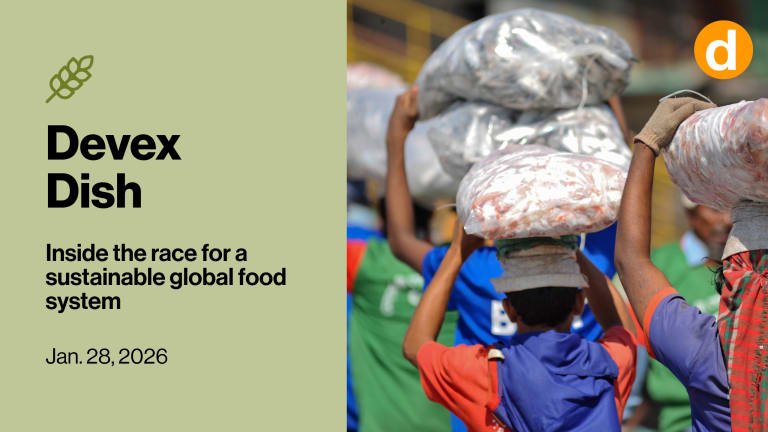
CANBERRA — How can storytelling and technology combine to tackle noncommunicable diseases in the Pacific? It’s a question InnovationXchange, the innovation arm of the Department of Foreign Affairs and Trade, and SecondMuse asked jointly in 2016. And this year, answers are forming.
The LAUNCH Legends initiative, part of the LAUNCH Food platform, has developed two pilot projects to determine the feasibility of immersive storytelling. Our Special Island for Tonga launched in April and Beyond the Stars will launch in Fiji later this year. The Pacific Islands have been battling NCDs for years, as obesity, diabetes, and cardiovascular disease continue to rise.
More from Taking the Pulse series:
► Suffering in silence: The deadly economic burden of NCDs
► New partnership aims for NCD 'best practices' in conflict, fragile settings
► Tuberculosis and NCDs jostle for space in global health agenda
Both projects encourage children to learn about healthy eating and traditional meals through play-based teaching. And while technology is core to the projects — the Tonga and Fiji initiatives both include an app and the Fiji program also uses virtual reality — storytelling is the focus. Flashcards, activity books, and storybooks form part of the total education experience.
Still, the pilot periods for both projects are limited, as are the schools they will operate in. Moving forward, the question arising is: How can a small pilot utilizing innovative techniques show sustainable impact?
The journey to launch
The journey for Our Special Island and Beyond the Stars began over two years ago, conceived by LAUNCH Legends’ senior adviser Davar Ardalan.
“It was clear that for health ministers in the Indo-Pacific, improving childhood eating behaviors was a major focus,” Ardalan explained to Devex. “The leaders were exploring new options in villages, schools, and households, to bring about an increase in consumption of fruits and vegetables and decrease in consumption of nutritious-poor imported foods with high fat, sugar, and salt.”
Utilizing her 22-year experience as a public media producer at NPR News in Washington, D.C., Ardalan wanted to determine the role of storytelling through emerging technology in better communicating NCD-related content.
“My theory was that by revitalizing traditions around food, we could enhance sustainability and nutritional values,” she said. “This meant that we needed to tap into the past in order to make an impact in the future. What better way to tap into the past than using immersive storytelling?”
After engaging iXc in the discussion, a small, curated group of thought leaders from tech, academia, and government were invited to expand the idea in a hackathon hosted by iXc in October 2016. The aim was to identify ways to use storytelling to influence children to eat healthier and bring back pride in traditional diets.
Next, a global call-out encouraged innovative producers to share their ideas and solutions — and S1T2 was funded to develop Beyond the Start, while Millipede was funded for Our Special Island.
A 12-month process occurred between announcing the innovators and the launch of their products, with the aim of understanding the social, health, and education environment to create resources that could have life beyond the limitations of the pilot.
The discovery phase
“The project had to be developed very closely with people in the country — because the developers are based out of Australia,” Ben Kreimer, senior adviser for LAUNCH Legends, explained to Devex.
Understanding the education system’s priorities and developing complementary learning resources that could support educational requirement were critical in this discovery phase. Government, teachers, parents, and health and education experts were consulted during the discovery phase to develop an action plan.
Communicating noncommunicable diseases
The terms "noncommunicable diseases" or "NCDs" don't exactly lend themselves to snappy and exciting communications campaigns. But with renewed energy around this global health issue, that has to change. Devex speaks to experts in the field to find out how to communicate the noncommunicable.
“We knew that a consumer engagement educational project in the Pacific would have to be localized and have community buy-in from the get-go,” Ardalan said.
It was also important during the discovery process to understand how innovation programs are sometimes perceived.
“During our discovery missions to country, there was a lot of aid fatigue,” Allan Soutaris, head of technical innovation with SecondMuse, explained to Devex. “Initially, we encountered … skepticism about the program ... But through the discovery process, we were able to form relationships and build trust … [with] key stakeholders, to make the program theirs.”
Developing both technology- and nontechnology-based materials helped to support the diverse needs within Tonga and Fiji, where internet coverage varies. It also helped creating a “Harry Potter style” immersive environment that enables both teachers and students to learn in the way that suits them.
“What we discovered — especially with teachers — was that those additional supporting materials were really integral to the program’s success,” Soutaris said. “In the case of Fiji, connection with data is an issue in some of the regional areas — not everyone will have data on their phones. So we needed to ensure the program could be enjoyed outside the tech space.”
Monitoring and evaluation
With the support of a donor agency, monitoring and evaluation is an integral component in the development of both the Tonga and Fiji pilot projects.
But with the Tonga pilot taking place over six weeks and Fiji over 10 , what does M&E look like?
“That has been one of the big question marks,” Kreimer said. “The M&E side has been extensive, but also conservative in what we think we can get out of it. We are not going to be able to determine if kids have changed their diets in nine weeks … The focus is on trying to figure out how engaging the materials are.”
Kreimer will prepare reports for Tonga — expected in September — and Fiji before the end of the year. Feedback will include app usage, and input from teachers and students on what worked and what didn’t.
“A lot of the conversations will be digging into the mechanics of the program and figuring the relationship between the different materials to find out what could there be more and less of — from a human-centered design focus,” Kreimer explained. “And given this is a prototype project ... the failures are just as — if not more – important than the successes.”
Urban and regional schools are both part of the pilots, to look at the differences in uptake of technical and nontechnical components by location.
So far, feedback from teachers in Tonga is positive, Kreimer said.
“Partly because it is a different approach to teaching concepts,” he explained. “It is less about rote learning and more play based — this hasn’t been part of the curriculum in these places.”
And there have been impacts beyond the classroom. Soutaris explained that in Tonga, they have seen children going home and asking parents to prepare fruit salad and some of the healthier foods that are depicted in the app.
“So much so that parents we spoke to in the pilot said they now go to the market and kids are asking [for] food [that] are in the app,” he said. “And if it’s not, they will get something else. We’ve been seeing some pretty amazing changes like that in a six-week pilot.”
Sowing the seeds for sustainability
The question of long-term sustainability for these projects has yet to be answered. The focus is on getting lessons on paper. But the two projects are owned by their respective developers, S1T2 and Millipede, who will be responsible for scaling, expanding, and enhancing the resources beyond the pilot period.
“While both are pilots support[ed] by iXc … they are projects of S1T2 and Millipede,” Soutaris said. “So an element of it is going to be what they want to do moving forward.”
SecondMuse will also be looking at the next phase and determining if there are partners that can be brought to the table to help them beyond the pilot phase. Opportunities may exist with telecommunication companies to make accessing the app easier through free data downloads, as well as improving network accessibility.
Focusing on the expansion of the “low-fi” aspects of the projects, printing additional resources is relatively cheap at $6 for the storybook and $2 for the activity book, making this easy to scale on demand.
But the partnerships already established the aim to create sustainability, according to Soutaris.
“In Fiji, because the project aligns with digital literacy program run out nationally, the [memorandum of understanding] we had signed with the ministry of education has gone up as a cabinet to paper to parliament,” he said. “There is definite interest in seeing how the program can be rolled out to be included in the curriculum post-pilot.”
The most important thing they have done with both projects, Soutaris said, is to align them with the national curriculum, including health interventions or programs that have been run existing in the country. Memorandums with the ministry of education and health in Fiji and letters of support from the ministry of health in Tonga show that there has been buy in and support for the program at the highest levels.
“In Tonga, there is a school gardening program and in Fiji it is trying to align with a WHO program promoting health in schools,” he said. “The hope for us is that if we prove the pilots work, … we can become part of an intervention.”
Aside from looking at the sustainability at these two particular projects, the aim is to look at the sustainability and feasibility of immersive storytelling in education generally, by providing evidence of what works and doesn’t using technology and other means of enabling greater engagement on a range of issues impacting children and their future.
Demand for development
While the developers, SecondMuse, and iXc have yet to release findings from these projects, it has not stopped interest in the concept of storytelling through technology to support a range of development challenges.
“We were invited with Millipede and S1T2 to talk at Games for Change in New York on the back of work being done,” Soutaris said.” Within the games sector, there has been interest in the work we are doing in the Pacific.”
But people are also looking at the framework of these programs to see how they can apply more broadly — and they have been asked to submit a proposal for a project in Tuvalu on child protection education.
“People have seen the process we have gone through and the framework we have built in terms of the technology and people are now thinking how they can use [it] for their projects,” Soutaris said.
There are half a dozen leads, not only in the Pacific — the demand is global. But they still want to show that the concept of storytelling combined with technology can work.
The project reports will be important releases to show their viability as part of the solution to the biggest challenges facing developing countries.
For more coverage of NCDs, visit the Taking the Pulse series here.







